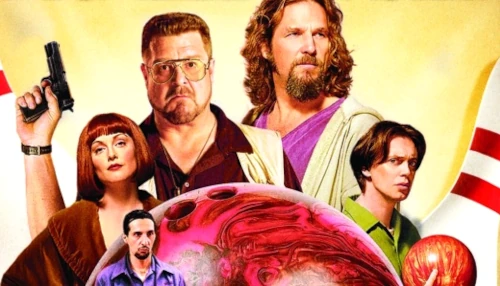
The Big Lebowski is a brilliant film by the Coen brothers, released in theaters back in 1998. Some people see it as just another offbeat comedy. Others, those who truly grasp its deeply subversive nature, experience it more like a revelation about meaning and the absurdity of life itself.
But fair warning: If you’ve never seen The Big Lebowski, stop reading right now. This post is packed with spoilers from start to finish. Do yourself a favor, find a way to watch it, and then come back. With this timeless cult classic, the worst that can happen is you’ll have a great time. The best? You might just discover an entire philosophy behind it.
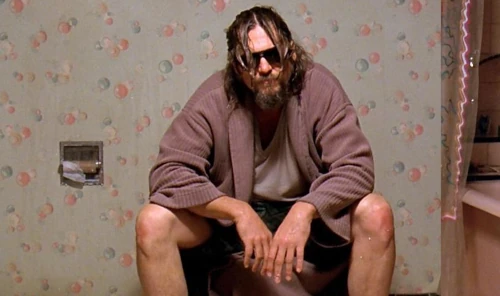
If you’ve spent more than two minutes on NovaFuture, it’s no secret: we’re more than just fans of The Big Lebowski. So this post is a chance to explain why. And maybe, just maybe, give you the itch to dive into a film that’s anything but superficial.
But let’s be clear: this isn’t yet another review of The Big Lebowski like the dozens you’ve probably read already. I’ll leave that to the so-called experts who always think they’ve cracked the film better than anyone else. Like the title says, this is simply a reflection on its social critique. And trust me, there’s a lot to unpack.
Is The Big Lebowski a subversive piece of social commentary?
Clue number one: To build the character and mythology of Jeffrey Lebowski, the Coen brothers took major inspiration from a real person: Jeff Dowd.
In his youth, Jeff Dowd was deeply involved in anti-Vietnam War activism. He joined the Seattle Liberation Front, a radical collective founded in 1970. He went on to become one of the infamous “Seattle Seven,” a group of protestors indicted after a heated demonstration outside the federal courthouse in Seattle. The protest was in solidarity with the Chicago Seven but ended in violent clashes with the police, injuries, and arrests. The group was charged with conspiracy to incite a riot.
Their trial quickly descended into chaos, marked by interruptions, hostility toward the court, and a complete refusal to cooperate with the system. The whole thing was declared a mistrial in December 1970. By 1973, all charges were dropped. That episode left a lasting mark on Jeff Dowd, and the Coens wove much of his rebellious spirit and political edge into the DNA of “The Dude.”
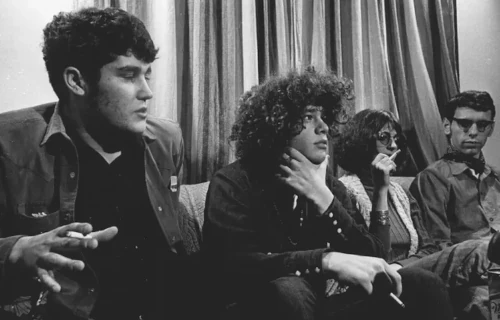
But don’t get the wrong idea: Jeff Dowd didn’t spend the next few decades wandering around in a bathrobe, sipping White Russians. His path looks more like a Steve Jobs arc, radical activist in his 20s, well-connected Hollywood insider by his 40s. Like many children of the hippie revolution, he reinvented himself inside the system. Dowd became a producer, selling a version of counterculture stripped of its radical edge and rebranded as pure aesthetic. To say he “betrayed his ideals” would be too harsh. Let’s just say he learned how to adapt them to the market.
Clue number two: the Coen brothers’ body of work.
Yes, there is social critique in their films, a lot of it. Fargo portrays an America drowning in mediocrity and blind greed. No Country for Old Men presents a society where the American Dream has collapsed into random, senseless violence. Burn After Reading mocks the national security state and the idiocy that defines post-9/11 bureaucracy. The Man Who Wasn’t There dissects the existential vacuum of modern man. These films are deeply political, but they barely scratch the surface.
Because that’s the Coens’ method: they never push the message too far. No slogans, no calls to action. Their critique is always sideways, cloaked in irony, absurdity, or deadpan detachment. They use allegory instead of outrage, metaphor instead of confrontation. And when tension starts to build, they defuse it with a joke, a bizarre twist, or an out-of-place character. Their movies seem to say: “Don’t worry, we’re just watching, not judging.”
But this vagueness isn’t innocent. It lines up perfectly with the expectations of a certain limp American left, the festival crowd, the campus panels, the NPR interviews, the studio-sponsored retrospectives. The Coens aren’t outsiders. They’re fully part of the system. They work with big stars, collect glowing reviews, and rack up awards. Their cinema invites reflection but never action. It flatters a cultured audience that likes to feel subversive while staying comfortably seated.
And yet, maybe it’s precisely this unstable mix, muted critique, sharp cynicism, and a layer of aesthetic detachment, that allowed for a character as complex and strange as Jeffrey Lebowski. Because he too is a contradiction: post-hippie, disoriented but clear-eyed, detached from modern life yet not angry about it, ridiculous but quietly political in how completely he opts out. Like the Coens’ films themselves, he’s a product of a world in crisis, just too disillusioned to pretend it can still be fixed.
Genuine friendship among misfits vs. the lonely cynicism of the wealthy
For the Dude, friendship happens naturally. It’s not based on status, social calculation, or shared ambitions. His friends come from completely different worlds: Walter, the obsessive Vietnam vet; Donny, quiet and spaced out; his landlord, an awkward but sincere amateur artist; and a whole cast of oddballs who orbit the bowling alley. This mix pulls the Dude out of his comfort zone. He has to deal with perspectives he doesn’t always get, and personalities he wouldn’t have chosen. But that’s exactly what makes it meaningful: this messy, dissonant group gives him something real, unfiltered, and human.
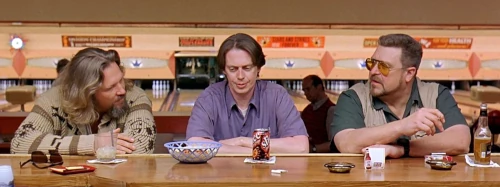
He owns nothing. He has no favors to trade, no influence to leverage. What he offers is just himself. And because of that, he never has to question the sincerity of the people around him. No one is trying to use him. There’s nothing to gain. That’s the foundation of honest friendship, not perfect, but grounded. He can disagree, get annoyed, even be confused, but he’s never betrayed.
A friend is someone who knows all about you and still loves you. – Elbert Hubbard
By contrast, the “real” Jeffrey Lebowski lives in a world completely sealed off. He surrounds himself only with people who depend on him: a sycophantic assistant, a trophy wife, and a handful of business-like acquaintances. What he gets from them isn’t friendship. It’s performance. They reflect his ego back at him, reinforce his sense of status, but bring him nothing real, nothing human. These aren’t relationships. They’re roles in a set piece.
And that closed-off world leads to more than just loneliness: it leads to total disconnection. By rejecting any kind of social, emotional, or existential diversity, the wealthy end up losing touch with reality itself. They live in a bubble of sameness, smooth and comfortable, but sterile. Where the Dude grows by clashing with difference, the elder Lebowski sinks into a sad little theater of self-importance.
The social fraud of the powerful: hollow speeches and the wreckage of the American Dream
The “real” Jeffrey Lebowski isn’t a background character. He’s a sharp-edged metaphor for a certain kind of arrogant elite, the kind that walks around like a hero without ever having done anything but be born in the right place. He talks nonstop about merit, morality, and hard work. He expects others to wake up early, be productive, take responsibility, lead by example. But what about him? He doesn’t work. He never built anything. He lives in absolute comfort, surrounded by paid yes-men, fake respect, and the illusion of stature. He’s the cinematic version of every powerful person who says “I earned it,” when in fact they never had to fight for anything.
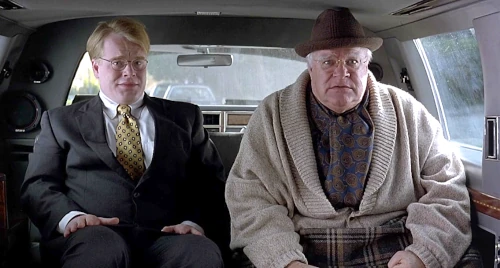
And that speech? You hear it every day. CEOs preaching meritocracy while underpaying their staff. Billionaires telling you “anything is possible” while crushing competition with inherited privilege. Public figures bragging they “started from nothing,” when “nothing” meant a trust fund, private school, and family connections straight into the upper tier.
So what about the American Dream? It’s the biggest narrative scam of the century. A superhero myth meant to guilt the poor and glorify the rich. The message is simple: if you don’t make it, it’s your fault. You didn’t work hard enough. You weren’t good enough. But the truth is, the starting line was never the same for everyone. This myth doesn’t lift anyone up, it just keeps power where it already is. It’s not a dream. It’s a defense mechanism.
And while these people sell morality like a brand label, they live in the shadows of shady deals. They’re the first to demand discipline, and the last to follow it. They preach ethics while hiding the bodies under rugs stitched together with money, connections, and legal immunity. They think they’re above everyone else. But what they really embody… is emptiness.
The “real” Lebowski could easily be Musk, Trump, Bezos, or some other billionaire who thinks his fortune puts him above everyone else. It’s always the same template: the power figure who believes money erases everything. But we see it. We remember. And no, we don’t admire them.
The fraud of contemporary art and its grotesque commodification
In The Big Lebowski, contemporary art isn’t celebrated. It’s mocked, shown for what it often is: a hollow shell, pretentious, absurd. Maude Lebowski embodies that pseudo-intellectual scene where meaning is replaced by jargon, and emotion by performance. She flings paint from a zipline, stages incomprehensible “happenings,” and speaks in a forced tone about abstract concepts she doesn’t even seem to understand herself. All of it, of course, funded by family wealth.
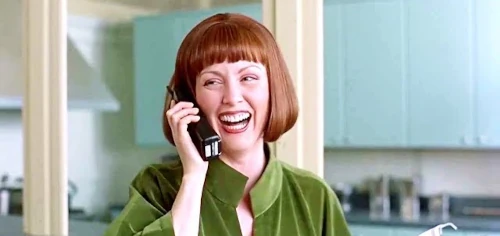
What the film exposes is a world where art no longer needs to mean anything, it just needs to exist within a closed circuit of insiders. People no longer create to express, but to circulate. A work isn’t valued for what it says, but for the name attached to it. The commentary around the art has replaced the art itself. It’s a spectacle, a market, a social currency. Sculptures are bought like stocks. And no one dares to ask what any of it actually means.
This extreme commodification isn’t just ridiculous, it’s deeply political. It turns culture into a luxury item. It excludes, flattens, and humiliates. It pushes the idea that you need to be “trained” just to feel something. And it gives elites a convenient way to recycle wealth into “art objects” that say nothing but are worth a fortune. It’s symbolic money laundering. Washing emptiness with money.
And in the middle of that, the Dude represents a radical refusal. He doesn’t understand that world, he doesn’t have its codes, and most importantly, he doesn’t need them. It’s not that he despises art. He just doesn’t recognize the legitimacy of a bubble that calls itself subversive while being fully embedded in the system. The film doesn’t just poke fun at an artistic trend. It shows how creation, once absorbed by the market, loses its ability to challenge anything at all.
Police and justice: when power no longer needs to explain itself
The Dude’s relationship with law enforcement is pretty clear: when he’s mistreated, ignored, or straight-up humiliated, it’s not because he’s done something wrong. It’s because he’s poor. Because he doesn’t fit the mold. Because he has no power. When his beat-up car, which he actually needs, gets stolen, the cops just laugh in his face. A report? Sure, they’ll get to it… maybe. Later. He gets brushed off. It’s not a priority.
Now flip it: if some rich guy had his Ferrari stolen, number eleven in his garage, there’d be an investigation, forensics, maybe even a task force. And it wouldn’t matter if his money came from porn, overpriced pharmaceuticals, trashy chart-topping rap, or a decade of lying about self-driving cars. That’s all fine. He’s rich, so he’s respectable. To get into serious trouble, you’d basically have to assault minors and get caught in public. And even then, you might still walk.
What that shows is simple: justice doesn’t operate the same way depending on who you are. We’re not saying it’s always like this. We’re saying that when it is, nobody’s surprised anymore. And the fact is, a lot of cops, not all but many, aren’t there to uphold justice. They’re there to protect the established order. And that order is deeply unequal. If you choose to live differently, outside the norms, far from consumerism, off the corporate hamster wheel, don’t expect protection. Call the police? Best case: they won’t care. Worst case: they’ll make it worse.

The Dude isn’t a criminal. He’s no threat to anyone. He’s just living life his way. And that, apparently, is already too much. For a certain view of law and order, simply existing outside the system is intolerable. And that’s what the film makes brutally clear: the law doesn’t defend equality. It defends power.
And this is where the film hits hardest: in this society, being a misfit is already suspicious. You don’t chase money, you move at your own pace, you refuse to play the game? Then you become a target: an anomaly that must be watched, dismissed, or punished. You want to live away from the system? The system will still come for you. Sooner or later. And the “good citizens,” the ones who do everything “right,” won’t lift a finger. They’ll say you had it coming. Because deep down, it comforts them. Better it happened to you… than to remind them how little freedom they really have.
When everything becomes a product, even death has a price tag
The Big Lebowski might come off as funny on the surface, but look closer, and it’s a chilling reflection on how human relationships are hollowed out by capitalism. Everything is for sale. Everything is transactional. Every connection becomes a bargaining chip, a tool for power, or a layer of social theater. And it starts early: Maude’s talk about having a child isn’t about wanting a baby. It’s a personal project, an artistic act, a genetic experiment. No father required, no emotional bond needed. Just a biological transfer, curated to serve a goal. Even motherhood is reduced to asset management.
The commodification of women’s bodies is everywhere. Bunny, the wealthy Lebowski’s wife, is paraded like a product: sexualized, ornamental, replaceable. Her entire character is an object, designed to be displayed, owned, consumed. On the other side, you’ve got Maude, supposedly a feminist artist, who turns both her own body and others’ into props for her intellectual posturing. It’s not about liberation. It’s about performance dressed up as progressive art. The “liberated woman” becomes just another product, rebranded as intellectual performance.
But the most disturbing part is that this logic of commodification doesn’t stop with women. In the world of the film, all human relationships are infected. No one helps, they bargain. No one connects, they negotiate. Identity, friendship, personal history, everything is either a deal or a threat. And for those who refuse to play along, the only things waiting are indifference or disdain.
Then there’s the ending. Even death doesn’t escape the marketplace. Donny’s ashes are returned in a repurposed Folgers coffee can, because the urn was too expensive. And even in that sacred, quiet, deeply human moment, they have to argue, pay, justify every cent. Nothing is spared. Even death becomes a budget item.
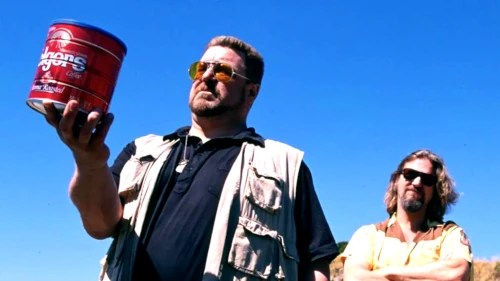
The Big Lebowski isn’t just a film about aimlessness or weirdos. It’s a portrait of a society where everything has been reduced to market value, including children, love, art, dignity, and death itself. It’s not satire. It’s a mirror. And what it reflects might be the most unsettling truth in the entire film, and in the world we live in.
War and masculinity as absurd and pathetic performances
In The Big Lebowski, war isn’t shown, but it’s everywhere. It lives through Walter, the Vietnam vet who drags every situation back into a battlefield mindset. Whether it’s a bowling game or a petty argument between friends, he yells, threatens, snaps, as if every social interaction could suddenly escalate into a military operation. Nobody asked him to fight. But he replays the war in his head because, in real life, he has no control. That’s how he stays “masculine.” That’s how he convinces himself he still matters. And that’s exactly what the film ridicules.
This version of masculinity, always searching for something to dominate, is shown for what it is: a grotesque leftover. Walter doesn’t protect anyone. He doesn’t understand what’s going on. He imposes, sabotages, intimidates, especially the people who care about him. He’s the image of a man out of place, clinging to myths of glory because he can’t admit he’s lost. He’s not a soldier. He’s a caricature of one. And around him? Nothing. No country to defend. No real enemy to fight. Just a series of absurd crises where he’s playing a role that no longer has meaning.
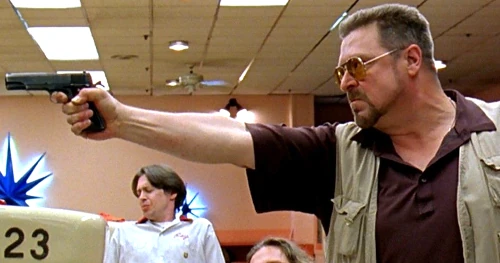
The film also makes clear how hollow this military-style masculinity becomes once removed from its context. It’s all theater. All posturing. A spectacle full of symbols that society still celebrates, even though they serve no real purpose. Courage, strength, honor? In Walter’s hands, these ideals collapse into paranoia and angry outbursts. This isn’t masculinity. It’s a control fantasy spiraling into noise.
Through him, the film dismantles the entire idea of the “strong man,” the leader, the enforcer of order. Because in truth, this version of masculinity protects nothing. Builds nothing. It’s just a way to hide the fear of no longer having a place in a world that has moved on. And that fear shows up as a desperate struggle to carve out space inside the pathetic fantasy world of men who imagine themselves as dominant.
Language as a weapon of confusion and social domination
In The Big Lebowski, the ones who speak the most aren’t the smartest, they’re the ones trying to control the conversation. And by controlling the conversation, they try to control everyone else. The “real” Jeffrey Lebowski speaks in hollow slogans and pompous phrases. He never answers a question directly. He delivers. He recites. He lays down a narrative that doesn’t tolerate disagreement. And Maude, the self-styled intellectual artist, does the same. She wraps everything she says in pseudo-theoretical jargon, loaded with references, concepts, and carefully chosen words meant to impress or dismiss. The content doesn’t matter. The form is what crushes.
Language becomes a tool of social intimidation. It’s no longer about understanding, it’s about asserting dominance, establishing superiority, and shutting down opposition. And this mechanism isn’t just reserved for cultural elites or the “great men” of the film. You see it with Jackie Treehorn, the pornographer. With the business guys. With the cops. All of them use language like a polished weapon, coded, polite, and razor-sharp. It’s the rhetoric of power, where speaking means dominating.
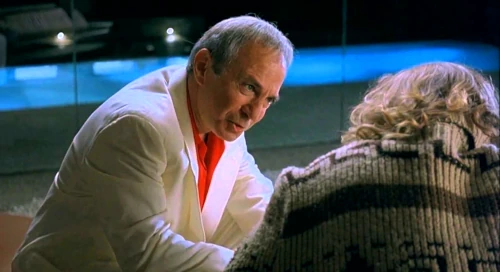
And what about the Dude? He doesn’t speak that language. He stumbles, hesitates, rephrases. He searches. And he gets mocked for it. But in truth, he’s the only one actually looking for meaning, while the others are just covering it up. He doubts where others dictate. And this inability to respond in the dominant code of authority creates a kind of alienation. He doesn’t have the words to defend himself in their world, not because he’s dumb, but because he refuses to play by the rules of verbal control.
The film quietly points to a deep, often ignored truth: Whoever controls the language, controls social reality. And those without access to that kind of language, they get sidelined, laughed at, or crushed. It’s not truth that wins. It’s the most authoritarian rhetoric.
Nihilism as the collapse of meaning and the choice to opt out
Let’s get something straight: nihilism isn’t just “We believe in nothing” shouted by three shirtless Germans.
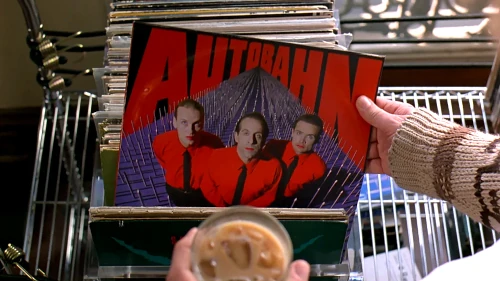
The Big Lebowski plays with the concept in a much deeper, more subtle way. It presents a world stripped of meaning, where traditional values (work, morality, family, success) have all become suspect. And that’s where Friedrich Nietzsche enters the picture: the philosopher who mapped this collapse better than anyone.
Nietzsche distinguishes between two kinds of nihilism. First, there’s passive nihilism, the kind that watches the world fall apart and does nothing. It sees that the old gods are dead, that the grand narratives are empty, and just sits there, paralyzed. Then comes active nihilism, the kind that takes that logic to the end. No longer believing in anything, it coldly destroys what remains. Not to rebuild. Just to revel in the wreckage.
And here’s the twist: contemporary capitalism looks a hell of a lot like active nihilism. But not the heroic kind. Not some Übermensch uprising. No, just the sterile repetition of “more.” More growth, more profit, more accumulation, even if it means draining the living world, crushing other people, and torching the planet.
It’s not “the market” that’s nihilistic in itself.
It’s the absolutism of market logic that turns nihilist.
It devours meaning, and offers nothing in return.
And while that machine is busy swallowing the world, The Big Lebowski quietly sneaks in something else. A counter-model. The Dude.
Lost? Sure. Slow? Maybe. But he destroys nothing. He doesn’t seek power. He doesn’t chase victory. He does what he loves. He moves at his own pace. He doesn’t lie. He doesn’t force. He’s the anti-nihilist, Taoist to the core. He represents letting go, being present, accepting chaos without adding violence. While others scramble to fill the void, he looks right at it, and finds a kind of peace.
It’s not resignation. And it’s not escape. It’s something closer to unnamed anarchism: not chaos, but philosophy. No flags. No manifestos. Just a way of living outside the absurd rules. And if you really look at him, the Dude checks all the boxes of an individualist anarchist. He rejects power games. He listens to instinct. He avoids pointless conflict. And above all, he stays human in a world that no longer is.
So maybe the Coen brothers didn’t do all of this on purpose. Maybe they were just channeling the fear, the fog, and the clarity of their time. But as with many artists, it’s the unconscious that hits closest to truth. And what it tells us here is this: Even in a world devoured by absurdity, you can still choose not to join in. You can still stand: no noise, no slogans. Just stand.
Why the Dude is still with us, and why that’s not ending anytime soon?
I first watched The Big Lebowski back in early 1999. I’d bought the DVD without much expectation. But right from the opening scenes, I was like: whoa, what is this bomb of a movie? But it wasn’t the social critique, or even the brilliant humor that left the biggest mark. I’d already been deeply involved in causes I believe in, so nothing new there. And I’ve seen plenty of good comedies. So that wasn’t it either.
What really stuck with me was the depth of Jeffrey Lebowski, brought to life by a phenomenal Jeff Bridges. A character instantly endearing, full of charisma, contradictions, strengths, flaws… In short, Jeffrey Lebowski is a beautiful human being who, despite himself, became a kind of everyday hero. Every time I rewatch the film, it feels like visiting an old friend I haven’t seen in years. No sequel needed. Please, never.
And at the end of the day, what truly matters is this: Everyone who loves this film ends up building their own mental version of a lifestyle far from burnout. Jeffrey Lebowski gives us a direction to follow. Doesn’t matter if he’s fictional or fantasized, what matters is that he exists for us.
Here at NovaFuture, we kind of see ourselves as spiritual orphans of Jeffrey Lebowski. Except that instead of drowning our helplessness in weird cocktails, joints, or absurd passions, we’ve got no choice but to look for strong answers to the chaos created by capitalism’s built-in nihilism. Every single day, we try to carve out a brighter path through the predators, their loyal enforcers, and the silent mass of bystanders who watch the world burn without blinking.
So if, in the middle of all this noise, The Big Lebowski can give us even a small chance to smile and cry together over what really matters, then hell yeah, we’ll take it. Because what brings us together makes us stronger.
This article took time, and the topic more than deserved it. I spent hours shaping it, and more than anything, I genuinely enjoyed every part of the process. All I hope now is that this feeling carries through, and maybe sparks something. Even if it’s just keeping the myth of Jeffrey Lebowski alive, the guy we still joke about with our bathrobes, our White Russians, and our stoner one-liners.
If you want to go further, I can recommend two amazing resources: the Reddit forum on Dudeism, and the fan forum for The Big Lebowski. Both are full of kind, curious people who’ll welcome you into the conversation if you want to dig deeper into the film.
And while I’m at it, thanks to everyone I’ve talked with on those forums. Your insights helped me see things more clearly, and made me realize that even after 27 years, this film is still being passed down from one generation to the next, without losing an ounce of its impact.
I’ll be honest: writing this post took a lot out of me. So now I’m gonna recharge before diving into the next one. But hey, dude! If you ever feel like offering a coffee or a White Russian my way on Buy Me a Coffee, I’ll accept it gladly, in the spirit of friendship.

Want to react to this article? Let's talk about it on NovaFlow! Here we provide you with a real free social network without any algorithm that allows for genuine constructive exchanges. Registration takes less than 2 minutes.